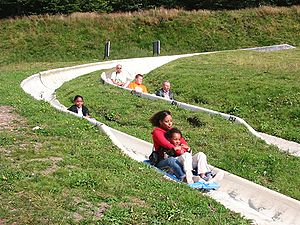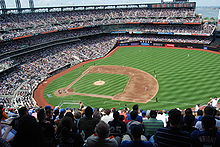Recreation

Recreation or fun is the expenditure of time in a manner designed for therapeutic refreshment of one's body or mind. While leisure is more likely a form of entertainment or sleep, recreation is active for the participant but in a refreshing and diverting manner. As people in the world's wealthier regions lead increasingly sedentary lifestyles, the need for recreation has increased. The rise of so called active vacations exemplifies this.
Health
A few individuals view recreation as largely non-productive, even trivial. Excessive recreation is not considered healthy, and may be labeled as escapism. However, research has shown that recreation contributes to satisfaction, and that the stress management aspects of it contribute to quality of life, health and wellness, happiness, and that the use of recreation as a diversion may have clinical applications to individuals with chronic pain and other health impairments. In some cultures and religions, recreation is encouraged on certain days and discouraged on others. For example, in Judaism, Shabbat is a day for recreation, study, and relaxation; many Christian churches also have Sabbath. However, others interpret Sabbath to be a day of worship.
According to research cited in Time magazine, stress is a major factor in many of the leading causes of death in the United States.[1]
Organized recreation

Recreation can become an organized activity of local governments and for-profit enterprises. Local governments often create parks boards and/or community centers. Growing interest and funding via grants and taxation can result in an official parks and recreation department, which provides venues and staffing for organised sports, at-risk-youth activities, arts and crafts, and senior citizen activities. Several U.S. state governments operate recreation programs for their prison populations. Though controversial, these programs are intended to provide inmates with constructive use of their time through access to music, hobbies, crafts and exercise equipment. Other possible benefits include reduced healthcare costs and a lower recidivism rate. Private organised recreation is usually focused on a specific type of sport such as river rafting or mountaineering.
Recreation as a career
Becoming a recreation specialist often requires a bachelor of arts degree in recreation management. A recreation specialist would be expected to meet the recreational needs of a community or assigned interest group. People with such degrees often work in parks and recreation centers in towns, on community projects and activities. Networking with instructors, budgeting, and evaluation of continuing programs are common job duties. Most U.S. states have a professional organization for continuing education and certification in recreation management. The National Recreation and Park Association administers an examination called the CPRP (Certified Park and Recreation Professional) that is considered a national standard for professional recreation specialist practices.[2]
Examples

|
Practicing or appreciating: |
In recent years, more exciting forms of recreation have received more attention, such as skiing, snowboarding, bungee jumping, sky diving, hang gliding, paintball, rock climbing, backpacking, canyoning, caving, BASE jumping, adventure tourism and motor sport.
See also
References
- ^ Claudia Wallis (1983-06-06). "Stress: Can We Cope?". Time. Retrieved 2007-06-14.
{{cite web}}: Italic or bold markup not allowed in:|publisher=(help) - ^ "CPRP Exam". National Recreation and Park Association. 2007. Retrieved 2007-06-14.
